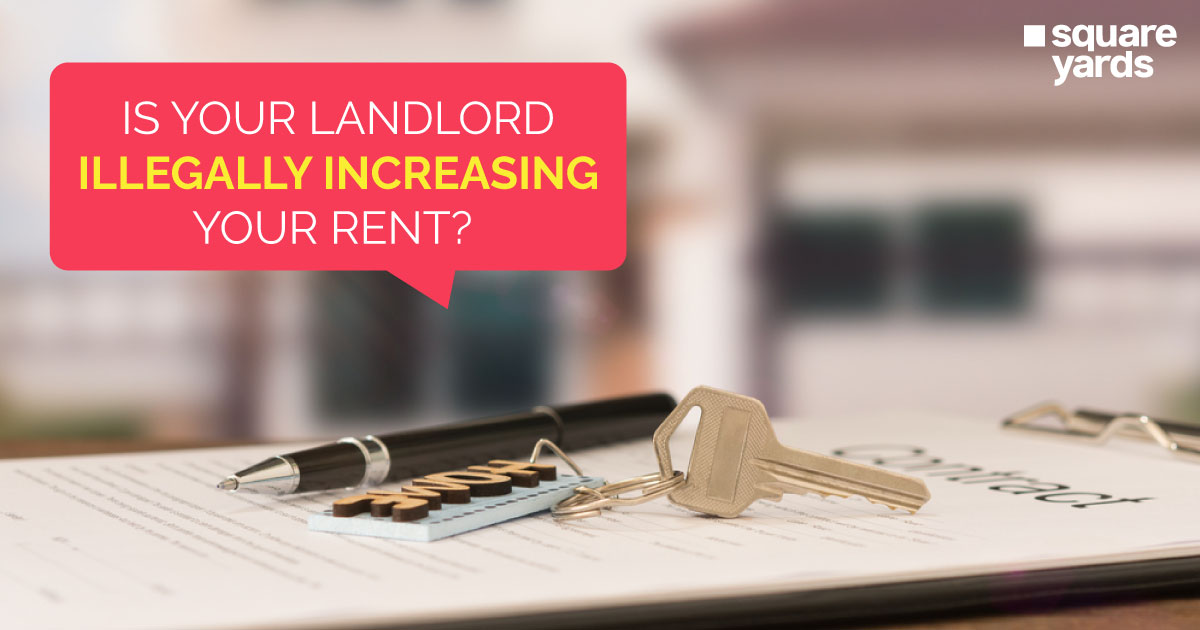The Dubai Land Department (DLD) is set to roll out a new law that pauses any issues regarding rental increase notice in Dubai for three years. This move by the DLD could be a plot twist in the Dubai real estate saga, offering peace of mind to residents and marking a bold step towards balancing the scales between landlords and tenants. Also, the rent price calculator is always available for you to ease your efforts and get you a rental price estimate. In this blog, we’ll dive into the details of this upcoming law, compare it with past rental freezes around the globe, and unpack what it means for you. Whether you’re a tenant or a landlord, in this real-life drama of living and renting, this guide is for you!
Rental Increase Notice in Dubai: Rent Freeze

A potential new law that could have a significant impact on rental agreements in Dubai has been announced by the Dubai Land Department (DLD). The law will be officially announced after it is published in the official gazette. However, a precise date for its implementation has not yet been determined. After this law is passed, rental agreements will be suspended for three years.
The DLD’s action is critical to stabilizing rental increase notice in Dubai market by giving tenants a sense of certainty and predictability over their rent payments. However, information about the precise language of this law, how it will be applied, and how it would affect landlords is still pending.
Rental Freeze in The Past
Around the world, rental freezes have been enacted in several places to stabilise rental markets. It also shields tenants from unexpected rental increase notice in Dubai, particularly during uncertain or crisis-ridden economic times. These freezes can be implemented for several reasons, such as managing housing shortages, preventing housing cost inflation, and offering support during recessions.
Location-specific rental freeze rules vary in length, extent, and the precise circumstances in which increases in rent are permitted or prohibited. While some freezes are meant to be temporary solutions to short-term economic or market volatility, others may be a part of a longer-term plan to keep housing affordable. Here are some instances of rental freezes:
-
- New York City: The city’s Rent Guidelines Board (RGB) determines rent adjustments for stabilised apartments annually. During certain periods, the RGB has voted for a freeze or minimal rent increases for these units.
-
- Berlin, Germany: In 2020, Berlin implemented a five-year rent freeze known as the “Mietendeckel,” which capped rents to combat rising rental prices. However, Germany’s constitutional court later overturned this law.
- California, USA: In 2019, California passed a statewide rent control law that, among other things, limits rent increases to 5% plus inflation per year, effectively limiting how much rent can rise annually.
Understanding Rental Increase Notice in Dubai

Rent increases and regulations can vary depending on the emirate. Generally, landlords must stick to specific guidelines when increasing rent to ensure fairness and transparency in the tenant-landlord relationship.
-
- In Dubai, the Real Estate Regulatory Agency, Dubai (RERA) outlines the conditions under which a landlord can increase rent. According to Decree No. 43 of 2013, the permissible rental increase notice in Dubai depends on how the current rent compares to the average market rental rate for similar properties.
For instance, no rent increase is allowed if the current rent is less than 10% below the average market rate. The maximum allowed increase ranges from 5% to 20% if the rent is more than 10% below the market rate, with specific caps depending on how much lower the rent is compared to the market rate. Additionally, landlords must give tenants a 90-day notice before the lease renewal date if they intend to increase the rent. - In Abu Dhabi, the landlord can increase the annual rent by up to 5% of the current rate at lease renewal. However, they are required to notify tenants at least two months before the contract renewal. The tenant can dispute any increase beyond 5% through the Abu Dhabi Dispute Resolution Committee.
- In Sharjah, the law prevents landlords from increasing rent for three years from the initial signing of the contract and then for another two years before any subsequent increase. There’s no specified percentage for rent increases, and the Sharjah Rental Dispute Committee handles disputes.
- Ajman’s regulations state that landlords cannot increase rent by more than 20% of the current rate and must wait three years from the initial contract signing before implementing any increase. Any intended increase must be notified in writing at least two months before the lease expires.
- In Ras Al Khaimah, landlords can increase the rent up to 5% for residential properties but must wait three years from the start of the tenancy contract before doing so. A 3-month notice period is required before increasing the rent.
- For Fujairah, a rent increase is capped at 5% and can only occur every two years after the first three years of the tenancy. Landlords must notify tenants in writing two months before the contract expires if they wish to increase the rent. If you see that any of the rules are not followed from your landlord’s or tenant’s side, don’t forget to report illegal renting house.
- In Dubai, the Real Estate Regulatory Agency, Dubai (RERA) outlines the conditions under which a landlord can increase rent. According to Decree No. 43 of 2013, the permissible rental increase notice in Dubai depends on how the current rent compares to the average market rental rate for similar properties.
Can Landlord Evict a Tenant?
Landlords in the UAE can evict tenants before their tenancy agreement expires for specific reasons. These reasons may include non-payment of rent, lease term breach, property misuse, endangerment, and reconstruction or demolition. If the landlord will use or sell the property, the tenant must receive a 12-month notice.
Eviction can also happen if the tenant fails to pay rent, sublets the property without approval, uses it illegally, causes damage, or uses it for another purpose. Upon the contract’s expiration, landlords can evict tenants for property reconstruction, extensive maintenance, and personal use, but they must always give a 12-month notice.
If you want to plan your rental expenses, try using the rent price calculator to know the rental price estimate.
Eviction Before The Lease Expires
In Dubai, a landlord may evict a tenant before the lease expires under certain circumstances, as specified by the Real Estate Regulatory Agency (RERA) under Dubai Rental Law Number 26 of 2007, amended by Law Number 33 of 2008. These conditions include:
-
- Non-payment of Rent: If the tenant fails to pay rent within 30 days of the landlord’s notification, eviction can be pursued.
- Breach of Lease Terms: Violations such as subletting without permission, illegal activities on the premises, or significant damage to the property.
- Property Misuse or Endangerment: Using the property for purposes other than those stated in the lease or activities that endanger the property.
- Property Reconstruction or Demolition: If the landlord plans to demolish, reconstruct, or undertake significant renovations that cannot be done while the tenant is occupied, eviction may be sought.
- Landlord’s Personal Use: If the landlord or their first-degree relatives wish to use the property for personal reasons, eviction can be pursued.
Eviction After The Lease Expires
If you’re renting a property in Dubai, it’s important to know your rights when your lease ends and your landlord wants you to leave. The Dubai Rental Law contains provisions provided by the Real Estate Regulatory Agency (RERA) that specify the circumstances in which a landlord may evict you. These conditions are:
- Personal use: Your landlord can evict you if they want to use the property for themselves or their close relatives. They must give you a 12-month eviction notice, either by registered mail or through a notary public.
- Selling the property: If your landlord decides to sell the property and needs it to be empty, they must give you a 12-month notice through a notary public or by registered mail.
- Major renovation or reconstruction: If the property needs major repairs or reconstruction that cannot be done while you’re living there, your landlord may evict you. They must show you a technical report from Dubai Municipality or similarly competent authority and give you a 12-month notice.
- Demolition: If your landlord plans to demolish the property, either for reconstruction or for any other reason, they have to notify you with a 12-month notice, together with all the necessary permits and approvals from competent authorities.
Wrapping Up
As we come to the end of our story about Dubai’s rental tale, tenants can breathe a sigh of relief and look forward to a more stable urban adventure. Don’t forget to double-check the rent agreement before moving in. You can use a rent price calculator to calculate the estimated rent. With the Dubai Land Authority, you can even report illegal renting house cases. Now that you are all set to legally deal with your tenant or landlord if you are the tenant, don’t forget to use the technical aspects mentioned!
Similar Suggestions For You:
|
RERA Rental Calculator Dubai |
|
|
Tenant Not Paying Rent |
|
|
Dubai Rental Market |
|
|
Renting Furnished vs Unfurnished |
|
|
Hidden Costs of Renting a House |
|
|
Short-Term Rentals vs Long-Term Rentals |
|
|
No Commission Rent in Dubai |
Frequently Asked Questions (FAQ’s)
It is not illegal for landlords to increase rent, but they must follow specific regulations set by the local authority governing rental properties.
The legality of increasing rent annually depends on the regulations of each UAE emirate. In Dubai, landlords can propose rent increases at lease renewal in accordance with the RERA Rent Index, but they must give tenants 90 days' notice before the renewal date.
Rent increases are generally not applicable to month-to-month agreements since these agreements are less common and are usually subject to the terms of a fixed-term lease that specifies the rent amount for the duration of the lease.
The maximum amount a landlord can raise rent is determined by comparing the current rent to the average market rate for similar properties. The caps range from 5% to 20% based on how much lower the current rent is compared to the market rate. Is it illegal to increase rent?
Is it legal to increase rent every year?
Can a landlord raise rent month to month?
What is the most rent a landlord can raise?




